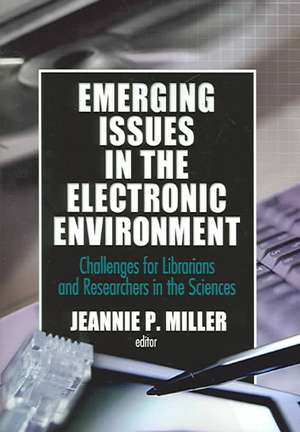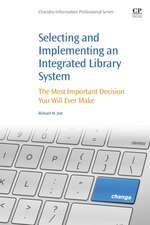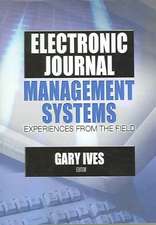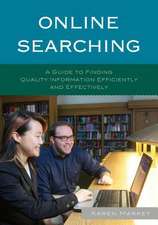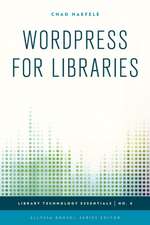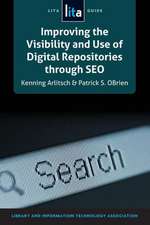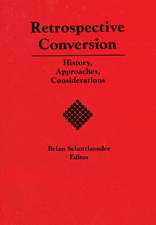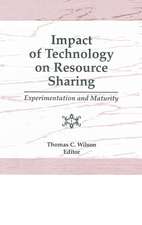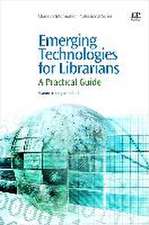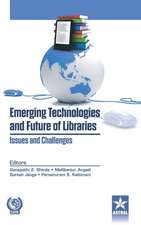Emerging Issues in the Electronic Environment: Challenges for Librarians and Researchers in the Sciences
Autor Jeannie P Milleren Limba Engleză Paperback – 7 feb 2005
This book examines the rapid advances in technology and scientific discovery that have changed the way sci/tech library users seek information—changes which have also necessitated increasingly high levels of skill in information technology and advanced subject knowledge from librarians. From negotiating the intricacies of working with e-journals to simplifying the data collection process, anyone involved in allocating library resources or prioritizing research agendas will find relevant, useful information here, as will those involved in library education.
Emerging Issues in the Electronic Environment: Challenges for Librarians and Researchers in the Sciences begins with “Scientific Communication: New Roles and New Players,” a detailed examination of the evolution of the information-seeking behavior of scientists, from the days of print-based resources to today’s electronic media. Next, you’ll find techniques designed to maximize the ability of scientists to make “lucky” connections in their electronic search for information in “Too Important to be Left to Chance: Serendipity and the Digital Library.”
Four chapters in Emerging Issues in the Electronic Environment bring you up-to-date information on various aspects of working with e-journals:
- “For Better or Worse: The Joys and Woes of E-Journals,” investigates the impact of electronic-only journal holdings on collection development decisions and the accompanying issues of archiving, economics, content, and research use
- “Scan It and They Will Come . . . But Will They Cite It?” provides citation data on the usefulness and impact of retrospective digitization projects for journal contents
- “The Use of Online Supplementary Material in High-Impact Scientific Journals” raises vital questions as to whether the print or electronic article should be regarded as the primary archival resource
- “Challenges and Opportunities for Bibliometrics in the Electronic Environment: The Case of the Proceedings of the Oklahoma Academy of Science” investigates how issues of access, copyright, and fair use, as well as differences among online file formats may impact bibliometric analysis
- “Information Overload: Keeping Current Without Being Overwhelmed” will show you how to identify needed sources by using current awareness services and e-mail filtering technologies
- “The Impact of Electronic Bibliographic Databases and Electronic Journal Articles on the Scholar’s Information Seeking Behavior and Personal Collection of Reprints” reviews organizational methods for managing large collections of electronic articles.
- “Biology Databases for the New Life Sciences” discusses the new sequence, microarray, and protein structure databases, the emergence of bioinformatics, and the opportunities available to librarians in this developing area
- “Map and Spatial Data Acquisitions in the Electronic Age” shows how the traditionally complicated and time-consuming process of acquiring cartographic information can be simplified by efficient use of the Internet
- “Webinar Technology: Applications in Libraries” reviews the operation, application, and features of Webinars and compares this technology with Web tutorials, virtual reference, and courseware management systems, videoconferencing, and Webcasting
- “Preserving Digital Librari
| Toate formatele și edițiile | Preț | Express |
|---|---|---|
| Paperback (1) | 131.12 lei 6-8 săpt. | |
| Taylor & Francis – 7 feb 2005 | 131.12 lei 6-8 săpt. | |
| Hardback (1) | 237.20 lei 6-8 săpt. | |
| Taylor & Francis – 8 feb 2005 | 237.20 lei 6-8 săpt. |
Preț: 131.12 lei
Preț vechi: 174.76 lei
-25% Nou
Puncte Express: 197
Preț estimativ în valută:
25.09€ • 26.20$ • 20.76£
25.09€ • 26.20$ • 20.76£
Carte tipărită la comandă
Livrare economică 04-18 aprilie
Preluare comenzi: 021 569.72.76
Specificații
ISBN-13: 9780789025784
ISBN-10: 0789025787
Pagini: 270
Dimensiuni: 212 x 152 x 17 mm
Greutate: 0.5 kg
Ediția:1
Editura: Taylor & Francis
Colecția Routledge
Locul publicării:Oxford, United Kingdom
ISBN-10: 0789025787
Pagini: 270
Dimensiuni: 212 x 152 x 17 mm
Greutate: 0.5 kg
Ediția:1
Editura: Taylor & Francis
Colecția Routledge
Locul publicării:Oxford, United Kingdom
Cuprins
- Introduction (Jeannie P. Miller)
- Scientific Communication: New Roles and New Players (Julie M. Hurd)
- Too Important to Be Left to Chance—Serendipity and the Digital Library (Elizabeth B. Cooksey)
- For Better or Worse: The Joys and Woes of E-Journals (Linda L. Eells)
- Scan It and They Will Come . . . But Will They Cite It? (Michael Fosmire)
- The Use of Online Supplementary Material in High-Impact Scientific Journals (Thomas Schaffer and Kathy M. Jackson)
- Challenges and Opportunities for Bibliometrics in the Electronic Environment: The Case of the Proceedings of the Oklahoma Academy of Science (Tony L. Bremholm)
- Information Overload: Keeping Current Without Being Overwhelmed (Patrick Sullivan)
- The Impact of Electronic Bibliographic Databases and Electronic Journal Articles on the Scholar’s Information-Seeking Behavior and Personal Collection of “Reprints” (Robert B. McGeachin)
- Biology Databases for the New Life Sciences (Katherine S. Chiang)
- Map and Spatial Data Acquisitions in the Electronic Age (Joanne M. Perry)
- The Virtual Patron (Lesley M. Moyo)
- Webinar Technology: Application in Libraries (Karen J. Docherty and Angi Herold Faiks)
- Preserving Digital Libraries: Determining “What?” Before Deciding “How?” (Jean Marie Deken)
- Index
- Reference Noted Included
Descriere
This book examines the rapid advances in technology and scientific discovery that have changed the way sci/tech library users seek information—changes which have also necessitated increasingly high levels of skill in information technology and advanced subject knowledge from librarians. From negotiating the intricacies of working with e-journals to simplifying the data collection process, anyone involved in allocating library resources or prioritizing research agendas will find relevant, useful information here, as will those involved in library education.
